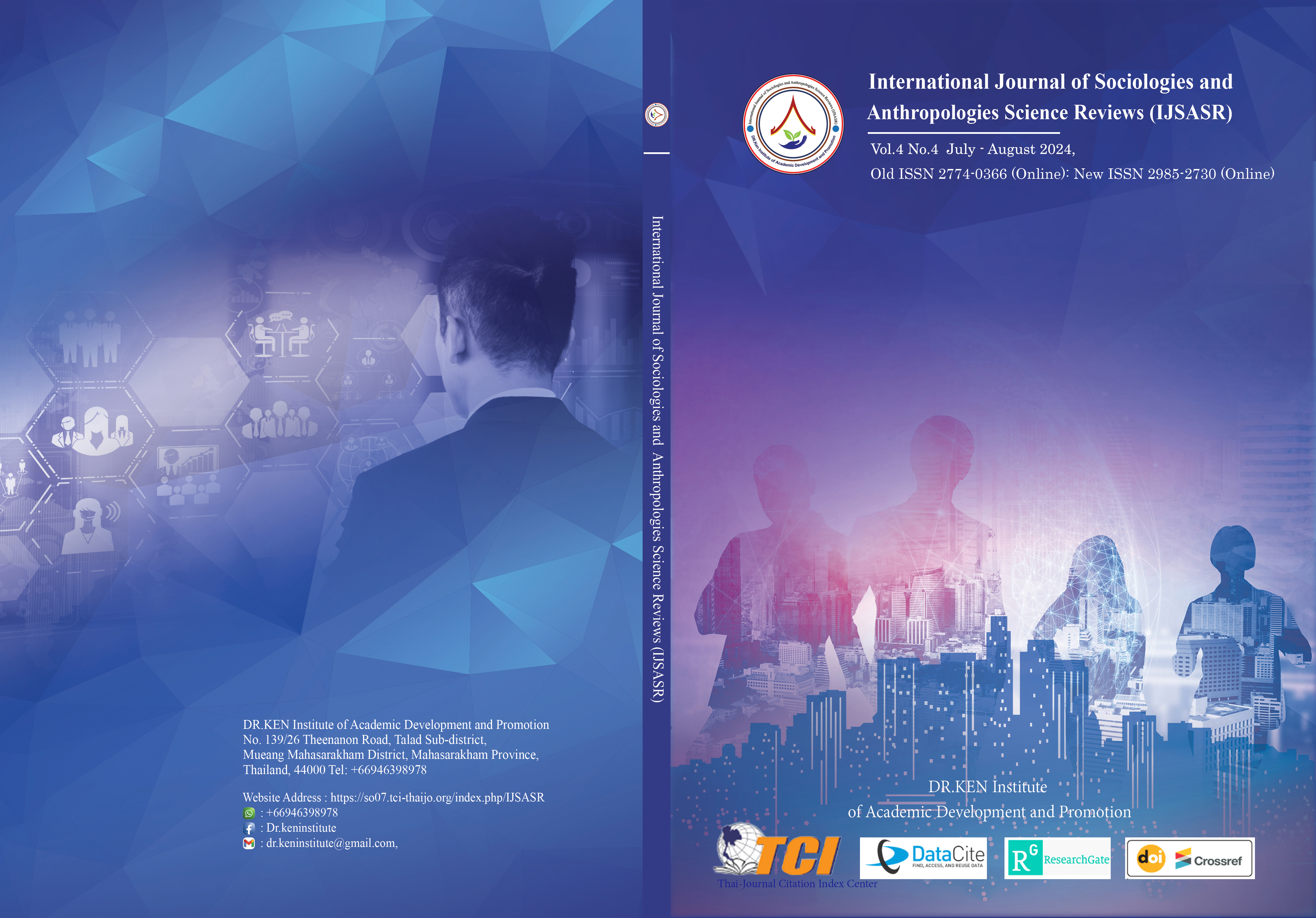Development of An Instructional Leadership Capabilities Model for Music Teachers at Private Music Institutions in Zhengzhou, Henan Province, China
Main Article Content
Abstract
Background and Aims: Instructional leadership practiced in music academia in recent years could also improve students' outcomes in music learning and increase music teachers' personal learning and teaching abilities. There were emerging private music institutions; Thus, the study aimed to create a model of instructional leadership capabilities for music teachers at private music institutions in Zhengzhou, Henan Province, China. The study employed a mixed-method approach, combining qualitative and quantitative research methods.
Methodology: Three hundred sixty-two music teachers from 16 private music teaching institutions in Zhengzhou participated. Data were collected through questionnaires and a Model Validation form. Descriptive statistics, such as mean, frequency, percentage, and PNIModified, were used for data analysis.
Results: the research results, which are of utmost importance, indicated that the mean PNImodified value for Teachers' Instructional Leadership Capabilities was 0.409. Among the specific capabilities, the application of technology had the highest PNImodified value of 0.913, followed by determining (criteria) standards with a value of 0.640 and participation of relevant personnel with a value of 0.418. These three capabilities had average scores higher than the mean PNImodified value, indicating a significant difference between the desired and current levels of these capabilities. Therefore, improving and developing these capabilities should be prioritized, as they were identified as weaknesses. On the other hand, ensuring resource support had a PNImodified value of 0.50, monitoring student performance had a value of 0.230, adjusting instructional content had a value of 0.281, emphasizing professional development had a value of 0.373, and shaping a collaborative culture had a value of 0.366. These five capabilities had average scores lower than the mean PNImodified value, suggesting they were strengths. Therefore,
Conclusion: the study concluded that the three capabilities needing priority development were the application of technology, determining (criteria) standards, and participation of relevant personnel. A theoretical model of instructional leadership capabilities was developed based on the research objectives' findings. Experts further validated the model to ensure its accuracy and effectiveness.
Article Details

This work is licensed under a Creative Commons Attribution-NonCommercial-NoDerivatives 4.0 International License.
Copyright on any article in the International Journal of Sociologies and Anthropologies Science Reviews is retained by the author(s) under the under the Creative Commons Attribution-NonCommercial-NoDerivatives 4.0 International License. Permission to use text, content, images, etc. of publication. Any user to read, download, copy, distribute, print, search, or link to the full texts of articles, crawl them for indexing, pass them as data to software, or use them for any other lawful purpose. But do not use it for commercial use or with the intent to benefit any business.

References
Chen, J., & Guo, W. (2020). Emotional intelligence can make a difference: The impact of principals' emotional intelligence on teaching strategy mediated by instructional leadership. Educational Management Administration & Leadership, 48(1), 82-105.
Glatthorn, A.A., Boschee, F., Whitehead, B.M., & Boschee, B.F. (2018). Curriculum leadership: Strategies for development and implementation. SAGE publications.
Gumus, S., Bellibas, M.S., Esen, M., & Gumus, E. (2018). A systematic review of studies on leadership models in educational research from 1980 to 2014. Educational Management Administration & Leadership, 46(1), 25-48.
Hadi, M. (2019). The Principal's Effective Leadership in Elementary Education. Elementary: Jurnal Iilmiah Pendidikan Dasar, 5(2), 127-140.
Hallinger, P. (2018). Bringing context out of the shadows of leadership. Educational management administration & leadership, 46(1), 5-24.
Hallinger, P., & Murphy, J. (1985) Assessing the Instructional Management Behaviour of Principals. The Elementary School Journal, 86, 217-247. http://dx.doi.org/10.1086/461445
Hallinger, P., Gümüş, S., & Bellibaş, M.Ş. (2020). 'Are principals instructional leaders yet?'A science map of the knowledge base on instructional leadership, 1940–2018. Scientometrics, 122(3), 1629-1650.
Ho, W.C. (2018). Culture, music education, and the Chinese dream in Mainland China (Vol. 7). Singapore: Springer.
Kumari, L. (2023). Instructional Leadership Role of Primary School Principals in Sri Lanka. International Journal of Latest Technology in Engineering, Management & Applied Science, XII, 08-17.
Lin, Y. (2021). Design of intelligent distance music education system based on pan-communication technology. In 2021 International Conference on Artificial Intelligence and Smart Systems (ICAIS) (pp. 415-418). IEEE.
Liu, S., & Hallinger, P. (2018). Principal instructional leadership, teacher self-efficacy, and teacher professional learning in China: Testing a mediated-effects model. Educational Administration Quarterly, 54(4), 501-528.
Lu, M. (2023). 中国音乐教育与国际音乐教育 [Chinese Music Education and International Music Education] by Jianhua Guan. Philosophy of Music Education Review, 31(2), 194-198.
Murphy, J.F., & Louis, K.S. (2018). Positive school leadership: Building capacity and strengthening relationships. Teachers College Press.
Ng, F.S.D., Nguyen, T.D., Wong, K.S.B., & Choy, K.W.W. (2015). Instructional leadership practices in Singapore. School Leadership & Management, 35(4), 388-407.
Pan, H.L.W., & Chen, P. (2011). Challenges and research agenda of school leadership in Taiwan. School Leadership & Management, 31(4), 339-353.
Rodrigues, H.P.C., & Ávila de Lima, J. (2021). Instructional leadership and student achievement: school leaders' perspectives. International Journal of Leadership in Education, 1-25.
Spillane, J.P. (2006). Towards a theory of leadership practice: A distributed perspective. In Rethinking schooling (pp. 208-242). Routledge.
Stephenson, C.G. (2017). Assessment of Leadership Effectiveness, Management Experience, and Core Competencies of Nurse Administrators in Healthcare Settings. Doctoral dissertation, Capella University.
Tao, S.L. (2014). A Study on Leadership Development and Model of Chinese College Students. East China Normal University Press.
Tian, Y. (2021). Anhui Opera: Towards Maintaining a Historical Regional Dramatic Opera Tradition in Contemporary China. Doctoral dissertation: University of Adelaide.
Walker, A., & Hallinger, P. (2015). A synthesis of reviews of research on principal leadership in East Asia. Journal of Educational Administration, 53(4), 554-570.
Yi, J.I. (2017). The Measures to Cultivate Students' Innovative Ability in Music Teaching. DEStech Transactions on Social Science Education and Human Science. DOI:10.12783/dtssehs/etmi2016/11206






